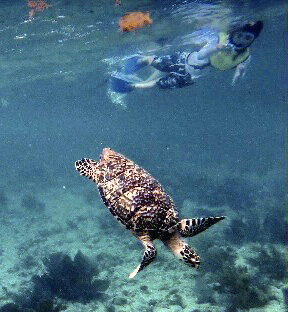Families In Nature
MarineLab has been educating students about the ocean since 1985 and several of our groups have been coming to us nearly that long! Every month we will feature a different group to tell us about THEIR MarineLab experiences and history. This month, we asked Heather Kuhlken of Families In Nature, based in Texas, to share her MarineLab experience with us.
How did you find out about MarineLab programs?
I participated in the MarineLab program as a high school student in 1991 with my Biology II AP teacher, Dr. Alice Kagi.
What was your first trip to MarineLab like?
When I came to MarineLab as a high school student, I fell in love! I had always loved the ocean but had not had many chances to deeply learn about it. Those five days changed the course of my life. I went home and decided to enter college as a Biology/Ecology major instead of in psychology. And I knew that I wanted to teach outdoors in the field after feeling how impactful experiential education was. I returned to MarineLab after my freshman year at Rice as an intern. During that summer, I asked the then-director, Art (Mitchell), how to get from here to there as a career. He told me to get a biology degree, add some field science experience, and then some teaching experience. I did just that. Art was an amazing mentor to me in college. I taught in the classroom for a few years and then decided that I wanted to go back to my plan of experiential education. I founded Families in Nature in 2008 as a small group of families going out to learn science and spend time in nature together. Since then, we have grown into a non-profit organization that is an international thought leader in the movement to connect people to nature.
Can you tell us about one student in particular who was really impacted by the MarineLab trips that you organized?
One of the students who has come to MarineLab three times, Harper Thomas (age 13), told me that MarineLab “is the first place I really understood the impact we have on the environment. It really clicked. I really got it.” Harper started coming with her mother at the age of 8 years old. She has developed such a strong love of the ocean that she got her scuba certification this summer and plans to join one of our trips to help out with citizen science in Costa Rica this coming July, tagging baby endangered Scalloped Hammerhead sharks and planting coral that was grown in a nursery. She is taking on leadership in ocean conservation as the founder of a new Austin chapter of the Heirs to Our Oceans program, and she will start her youth conservation leadership Humboldt Project next summer. Harper’s MarineLab experience, in addition to her Families in Nature participation, have shaped her as a student and as a conservationist.
Why do you keep coming back? How does MarineLab compare to other science-oriented programs that you have experienced?
I started bringing Families in Nature to MarineLab in 2013, when my oldest child, and the oldest kids in my program were finally old enough to participate in the program (I couldn’t wait for them to be old enough!). Returning to the campus after twenty years away was like coming home. All of the children that attended that year (and most years) have kept their interest in the ocean, and many have taken on youth conservation leadership projects with Families in Nature.
We keep coming back because MarineLab is the most effective, fun, unique, interesting and engaging immersive nature education program I have ever experienced (and I have taken students on a lot of trips to many different locations and programs). The kids (and adults) enjoy the program so much and always come home more knowledgeable, more curious, more engaged with their learning, and more inspired than when they arrived. We have many kids who have participated in the MarineLab program several times. MarineLab is extremely effective at connecting people to nature, which is the basis for all of conservation as well as the development of environmental literacy and scientific learning.
What do you tell parents who are nervous about sending their child on a snorkel trip?
Even if you feel nervous, dive in! It is worth it! I have been joining MarineLab trips for many years and have always felt that they adhere to the highest safety standards. They have great student to teacher ratios, they have teachers in the water with the kids, there are multiple adults on each boat capable of handling any issues that could arise, they watch the students very carefully, and they make sure everyone in the water feels safe and comfortable. All while fostering connection to nature and teaching a deep understanding of marine ecology.
Is there any advice you can give to another teacher who is thinking of bringing their students to MarineLab?
Definitely bring your students to MarineLab! You will not regret it! They learn an incredible amount in only a few days, and because the lessons are tied to visceral, experiential memories, they won’t ever forget them.



